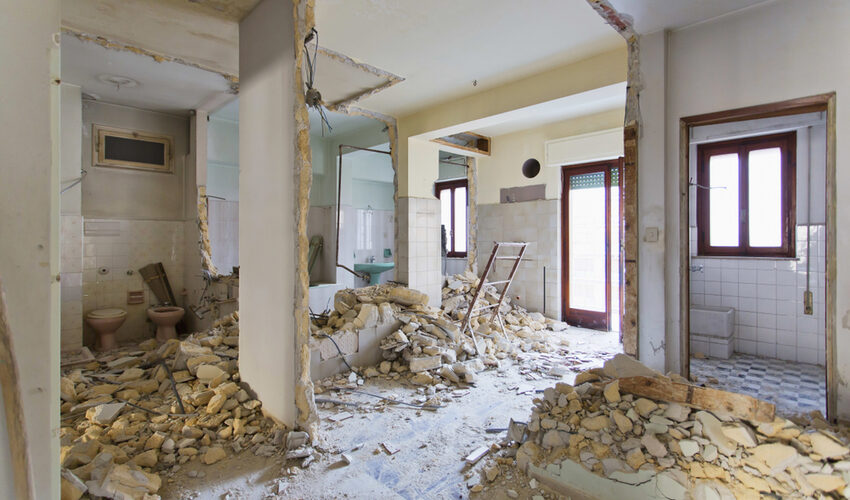Tips To Take The Stress Out Of Building Work On Your Home
There are many types of building work you can conduct on your property, and there are many different reasons for doing so. You might simply be trying to bring your vision for your home closer to reality with some ideal improvements, increasing the value of the property by adding things like extensions, new bedrooms, or even knocking through walls to create an open-plan space. One of the most common reasons nowadays is to add a dedicated office space to facilitate working from home which, in turn, can provide a better work/life balance. However, as most people agree that ‘having the builders in’ is equally as stressful as arranging a wedding, buying a house, or having a baby, we have provided the following tips for taking the stress out of building work on your home.
Be Prepared
Perhaps it is stating the obvious, but before you even get started, ensure you are fully prepared for the disruption the building work is going to cause. Oh, that dust! It will get everywhere, even in the rooms not being altered. Three things will help:
- Pack away as many pictures and ornaments as you can and ensure soft furnishings are covered.
- Ensure clothes are put away properly.
- Perhaps most importantly, accept there’s going to be a lot of mess and make a pact with yourself not to obsess excessively.
Do have extensive pre-start conversations with your builders about time frames and insist they are realistic. A large percentage of building works go over the estimated build time. This is particularly important if main facilities in your home are being affected such as kitchens, toilets and bathrooms. Could you stay with family for a short period? Or perhaps you could consider hiring a temporary mobile kitchen/bathroom/toilets to make the building works less stressful?
Similarly, ensure you have budgeted for any extras. There are always extras! Sometimes, this might be because you make a decision to upgrade an element of the works, but more often it is because an unexpected problem occurs. Suddenly finding you don’t have enough money to meet costs is clearly incredibly challenging!
And then, of course, you need to ensure that you have the more technical elements in place so there are no problems or surprises and your building works are completed in the most efficient and the least stressful way possible!
Getting Permissions
Not every bit of construction work is going to require you to get permission from a higher authority, but in many cases, this will have to happen. If you hire a contractor to do the work, you won’t have to bother with submitting a full plans application. However, this will be the case if you intend to do the work yourself or hire someone that is not registered with a competent person scheme run by the UK government, for example. Other than this, you might need to get planning permission, but this is usually only for new work or something that is a major addition to your property, such as an extension to the building.
Hiring Contractors
As well as hiring builders who are registered with a competent person scheme, you will also want to consider hiring other contractors that will be able to identify any potential problems beforehand. If you intend to create an extension or a new, detached structure on your property, you’re going to want to identify whether you want things like running water or even electricity in that new build. If you want water, you’re going to need a plumber, but if not, you might need to hire one anyway to check if there are any pipes in the way that will need moving. The chances are you’ll want electricity, and so you’ll want to hire a local electrician like those from Trade Facilities Services, who can work with you and your other contractors to get the electrics set up throughout the new build without any excessive issues.
Paying For Insurance
Injuries and damage to properties are not uncommon during a project like this, and this is why professional contractors will have some form of insurance in place. However, you’ll want to consider getting your own insurance, too, as if there is any damage or injuries that occur which are caused by yourself, then you’re going to want some form of financial protection in place to cover those issues. Otherwise, you’ll be paying out of pocket to handle these issues. This could be to cover any medical costs for yourself or others or even to replace broken or lost materials that are needed for the project.
Be Prepared For Problems
As already mentioned, taking the stress out of building work is particularly important in terms of keeping your renovation project on budget rather than anything else. Of course, preparing yourself for unforeseen problems will help you to manage your own expectations with the timeline of the build, but more importantly, it’ll allow you to factor these problems into your budget. Creating an emergency fund as part of your project budget will help alleviate the stress caused by unexpected costs. These can include material loss, the hiring of new contractors, or even the rise in the cost of the overall project due to things out of your control like the cost-of-living crisis.

